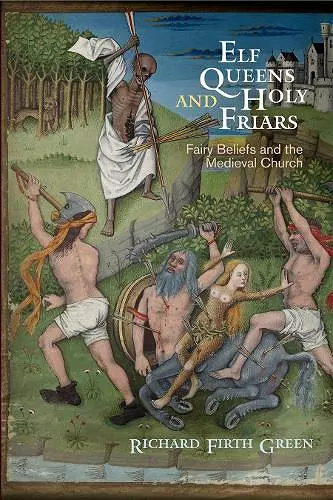Elf Queens and Holy Friars
Fairy Beliefs and the Medieval Church
Format:Paperback
Publisher:University of Pennsylvania Press
Published:30th Jul '18
Should be back in stock very soon

This book explores the medieval church's campaign against fairy beliefs and its implications for understanding vernacular culture and romance literature, particularly in Elf Queens and Holy Friars.
In Elf Queens and Holy Friars, Richard Firth Green delves into a significant yet overlooked aspect of medieval culture: the widespread belief in fairyland. He posits that the primary cultural divide in the Middle Ages was not solely between the affluent and the impoverished, but rather between the educated elite and the general populace. This perspective allows Green to examine how the church systematically demonized fairies and transformed the concept of fairyland into something sinister. By analyzing the rhetoric of medieval preachers, he reveals that their denunciations of demons often served as veiled attacks on fairy beliefs, highlighting a complex interplay between ecclesiastical authority and popular lore.
The book provides a meticulous account of the church's efforts to suppress or redirect beliefs surrounding fairies, including fairy lovers and changelings, as well as alternative narratives of the afterlife. Green argues that the church's serious approach to these fairy beliefs indicates their ideological significance, which, in turn, influences our understanding of medieval romance literature—an essential genre that explicitly engages with these themes. As the church intensified its campaign against fairy beliefs toward the end of the Middle Ages, this conflict played a crucial role in the subsequent witch hunts of the Renaissance.
Elf Queens and Holy Friars opens up new avenues for exploring medieval vernacular culture through the lens of demonology and pastoral theology. By revealing the coded references to popular beliefs within these religious frameworks, Green invites readers to reconsider the cultural dynamics of the medieval period and the enduring impact of fairyland on its literature and society.
"Much has been written on medieval fairies in the past twenty years or so, but in Elf Queens and Holy Friars Green succeeds triumphantly in bringing new insights and thoughtful analysis to their history and their metamorphoses into divergent forms, as the early modern world begins to take shape." (The Times Literary Supplement) "As a guide to the traditions of Britain and France, [Green's] can't be surpassed. This is cultural history from below, not the usual top-down perspective. . . . It is not only original, sensible and deeply researched but accessible. Not only medievalists will actively enjoy reading it." (London Review of Books) "This wonderful book is a rare example of work which is genuinely interdisciplinary, making an equal contribution to our understanding of medieval romance literature, Western Christian theology and medieval Western European cultural history. It does this by bringing together two different bodies of source material-the romances and the writings of medieval churchmen-in both of which the author is equally expert. The result is a whole series of exciting new insights, centred on the theme of fairyland as a contested site in a struggle between official and unofficial cultures in the high and late Middle Ages." (Time and Mind) "A new book by Richard Firth Green is always a significant event, and this one, surveying fairy beliefs in the Middle Ages, is set to become the work of first recourse on the subject. It is scholarly, meticulously researched beyond the limits of all the more familiar examples, and is in many respects a profoundly revisionary account of such beliefs. It deserves to be read not just by folklorists and critics of those medieval romances in which fairies figure, but by cultural, social, and intellectual historians, theologians, and historians of witchcraft." (Speculum) "Elf Queens and Holy Friars is a lucid, rich and engrossing book. Green sustains his case for the contingency and variety of medieval fairy beliefs, while also making a coherent and compelling argument about medieval clerical approaches to such beliefs. The study is likely to become a staple of reading lists across a number of areas of literary and cultural history; however, its appeal should extend well beyond the academy. Elf Queens and Holy Friars is a deeply learned book, but it wears that learning lightly; there is much here for readers new to this field to enjoy, not least the sheer entertainment value of many medieval fairy accounts." (Literature & History) "Although I have brushed up against suggestions of fairy lore and activity many times in the materials with which I work, I have taken them for granted up to now, which also means I did not think very hard about them. Reading this book has illuminated a large expanse of material much more deeply and intimately than I imagined possible." (Claire Fanger, Rice University)
ISBN: 9780812224252
Dimensions: unknown
Weight: unknown
304 pages